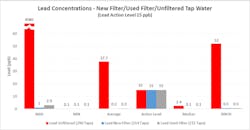EPA: Flint's water is safe
FLINT, MI, June 24, 2016 -- The U.S. Environmental Protection Agency (EPA), in coordination with the U.S. Centers for Disease Control (CDC) , completed testing of water filters in Flint and found that the filters distributed by the State of Michigan effectively remove lead or reduce it to levels well below EPA’s action level of 15 parts per billion (ppb).
Over the past 2 months, EPA, at the request of CDC, collected additional samples at nearly 50 locations considered to be at high-risk for lead contaminated water–locations with full lead service lines, galvanized plumbing, and where the most vulnerable populations live, including pregnant mothers and children. The results provide strong reassurance of previous findings of the effectiveness of filters in removing lead. Nearly all filtered water came back at concentrations well below 1 ppb. The results of this effort are almost identical to a previous assessment in which EPA sampled close to 300 homes.
Based on EPA’s findings and previous independent filter testing by Virginia Tech University researchers and NSF International which certifies water filters, all local, state and federal agencies involved in the Flint crisis response agree that the use of these NSF verified filters makes water safe from lead for all populations. Pregnant and nursing women and children no longer need to drink bottled water to avoid lead exposure as long as they drink water that has passed through a filter rated to remove lead from drinking water.
“These findings reaffirm the effectiveness of filters at removing or reducing lead. This is an important step forward for providing a stable water system for the City of Flint,” said Tom Burke, EPA Science Advisor and Deputy Assistant Administrator for EPA’s Office of Research and Development. “Residents can be confident that EPA’s sampling results correspond with previous tests and are consistent with outside experts’ findings.”
“With the results of this testing, residents can be confident that they can use filtered water and protect their developing fetus or young child from lead,” said HHS Assistant Secretary for Preparedness and Response Dr. Nicole Lurie, who has led federal support efforts for the Flint crisis response. “It’s crucial that people in Flint install filters on faucets they use for drinking water, cooking, or brushing their teeth, and replace the filter cartridges regularly.”
The State of Michigan began making filters available in Flint for free in January 2016 and to date, FEMA has provided the state with more than 50,000 filters and over 243,000 filter replacement cartridges.
In late January, water samples taken by EPA, the Michigan Department of Environment Quality, and Virginia Tech researchers showed lead levels in some Flint homes exceeded 150 ppb. The companies that produce the filters had conducted testing to rate the filters up to 150 ppb, 10 times the EPA action level. Although previous Virginia Tech research had found the filters effective in removing lead at much higher levels, out of an abundance of caution, state and federal health agencies recommended that young children and pregnant women use bottled water to reduce the likelihood of lead exposure in babies and children under age 6.
This announcement makes the use of water filters in Flint even more important than before. To assist with installation of filters and replacement cartridges for everyone in Flint, Michigan Works! intends to begin recruiting local residents to be trained as Filter Education Liaisons as part of a grant from the U.S. Department of Labor. This work will play a critical role in ensuring Flint residents are aware of the safeguards that will protect against lead-contaminated water and in assuring that everyone who needs help can access it. Although this is positive news, agencies at all levels of government recognize that additional work is needed. The city, state, and federal governments are committed to working together to meet the overall goal of building a lasting, sustainable water system, one that has the capacity to provide clean drinking water to all residents.
In the coming weeks, information on the Filter Education Liaison position will be posted to the Hot Jobs section ofwww.gstmiworks.org. You can also learn more by stopping by Employment Services at GST Michigan Works! at 711 N. Saginaw Street, Flint.
To read the filter report, visit www.epa.gov/flint/filter-study.
